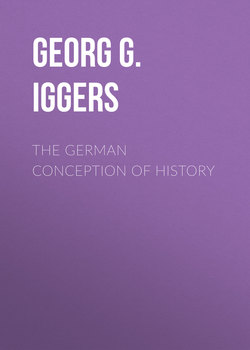Читать книгу The German Conception of History - Georg G. Iggers - Страница 7
На сайте Литреса книга снята с продажи.
ОглавлениеPreface to the Revised Edition
Since this volume was first published, a good deal of rethinking has taken place in historical studies in the Federal Republic of Germany. Continuities with older traditions and outlooks persist, but a large number of historians have begun to look critically at their national past. This critical perspective has been accompanied by a reorientation in methodology, away from the narrowly person-oriented approach of traditional German historiography to a concern with the social context in which political history takes place. I very much felt that the new edition of The German Conception of History should reflect the transformation of historical conceptions since the 1960’s.
The chapter that has been added to the new edition by no means aims at completeness. It rather seeks to grasp the changes in style, outlook, and methodology that characterize the new historiography. It is difficult to reduce the new scholarship to a simple common denominator. There is much more diversity in the work of the historians of the 1960’s and 1970’s than in that of their predecessors. Nevertheless, there is an effort in much of the historical writing of the last twenty years to arrive at an understanding of Germany’s tragic past. Much of the new final chapter deals with this concern. This emphasis explains certain of the omissions of the chapter—as well as of the book generally—such as the neglect of the important literature on medieval and early modern history. It also explains the focus on the new critical social historians of politics at the expense of more traditional, narrative approaches which have gained in importance in recent years.
There are other omissions. The final chapter focuses on historical studies in the Federal Republic. This is justified by the theme of the book, the development and decline of what I have called “The German Conception of History.” There is, however, an international literature on modern Germany. The emigré historians of the 1930’s were among the first to analyze the German recent past critically. This examination has been carried on by a younger generation of economic, social, and intellectual historians in the United States, Great Britain, Israel, the German Democratic Republic, and elsewhere. There is need for a study of German historiography that transcends political borders and concentrates on problems and methods.
After fifteen years I naturally have certain second thoughts about this book. The book was never intended as a comprehensive survey of German historical studies. The original preface made clear that it dealt with the history of a specific politico-intellectual tradition which dominated historical writing at the university from the mid-nineteenth century until the 1960’s. The two recently published analyses of historical studies during the Weimar Republic by Hans Schleier and Bernd Faulenbach have demonstrated anew the dominance of this ideology over the German historical profession. But there were also at all times voices of dissent to the illiberalism of the establishment and to its narrow focus on politics. I was very much aware of the liberal, democratic traditions in Germany. But the historians of democratic persuasion were mostly outsiders to the profession. Nevertheless were I to rewrite the book I would give greater space to them. Similarly the important impulses for a critical social approach to history came from scholars who were either outside the discipline like Ludwig von Stein, Gustav Schmoller, or Max Weber, or entirely outside the university such as Karl Marx. Again the reader should be aware that alternative traditions and approaches existed. I have also learned a good deal from Fritz Ringer’s analysis of the German academic community, The Decline of the German Mandarins, which appeared in 1969, the year after my book did. To be sure, my book does not treat historical ideas in a vacuum. I am very much aware of the political context of historical writing. I would, however, today give greater attention to the social structures within which historical research and writing took place.
I am very grateful to the many historians who in the past fifteen years have given me an opportunity to discuss the changing status of historical studies in the Federal Republic. I give particular thanks to the following persons who read and commented on the new chapter in manuscript form: William S. Allen, Kenneth Barkin, Volker Berghahn, Konrad Jarausch, Larry E. Jones, Michael Kater, Jürgen Kocka, Alf Lüdtke, Hans Medick, Hans Mommsen, Hans-Jürgen Puhle, Ernst Schulin, Rudolf Vierhaus, and Hans-Ulrich Wehler. I also would like to thank Rudolf Vierhaus for having permitted me, during my various stays in Germany, to use the Max-Planck-Institut für Geschichte in Göttingen as a base for my studies in German historical scholarship.
Buffalo, August 1982
